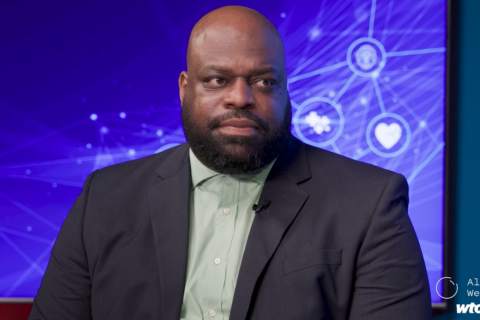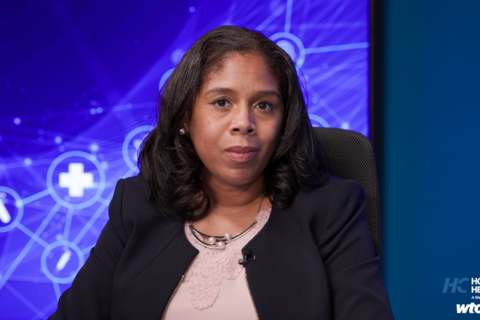Every 2 seconds, someone in the United States needs blood — that’s likely faster than you are reading this sentence.
“That constant need makes donating blood a vital public service that saves lives,” said Nicholas Lilly, senior director of Inova Blood Donor Services. Lilly sat down with WTOP for our 2024 Get on Top of Your Health series to talk about the importance of donating blood and the impact on local communities.
“The nation is facing a blood supply shortage: Although 62% of the U.S. population is eligible to donate blood, only 3% do,” Lilly shared. At Inova Blood Donor Services, the goal is to help patients across the Washington, D.C., region.
“All of the blood products that are donated within Inova stay within our area. We actually are the largest hospital–based blood center in the United States,” he said.
Through three blood centers and daily community blood drives, Inova supplies life-saving blood products to its five hospitals, 13 regional hospitals outside of the Inova network and first responders across Northern Virginia.
Can you spare 60 minutes for your community?
The donation process takes about an hour.
“We are going to have you complete a donor history questionnaire. We’ll do a mini physical to check blood pressure, pulse, temperature and hemoglobin or iron levels,” Lilly explained.
And don’t let the needle deter you. “That one little pinch that you feel in that one moment is very small and miniscule compared to what those patients on the other end are feeling before they are able to benefit from your volunteer donation,” he said.
“The best thing you can do is become a regular blood donor,” Lilly said. You can donate different blood products, including whole blood as well as its components: red cells, platelets and plasma.
He briefly explained how the four blood product types help patients:
> Whole blood: This can be used for transfusions, shared in bulk during emergencies to help multiple people and easily separated into the needed components.
> Red cells: They “are used for more than 70% of all transfusions. They are often given to trauma patients and those with blood disorders such as sickle cell anemia.”
> Platelets: These can “help stop bleeding patients recovering from cancer, leukemia, open heart surgery and transplant surgery.”
> Plasma: It is most often “given to trauma, burn and shock patients, as well as those with severe liver disease and multiple clotting deficiencies.”
Having a diverse donor base is also important and should reflect the patient population, Lilly said. “Diverse donors can have unique properties within their blood that have a positive impact on our diverse patient population. We are all about diversity, equity and inclusion.”
Once someone donates, the blood is shipped to Inova’s processing center in Sterling, Virginia, where it is tested and stored. “If you donate at 10 p.m. today, by 10 a.m. tomorrow that blood is labeled and ready to be shipped to a patient,” Lilly said.
Can your local group host a blood drive?
By hosting a blood drive, schools, businesses as well as government and community organizations can play a significant role in boosting donations.
“We have blood drives at gyms, community centers, libraries and places of worship. We work with restaurant groups, and we engage with multiple businesses, buildings and office parks too,” Lilly said. “We will go anywhere because we understand that it’s about putting our patients first and making sure that we are as convenient as we can be.”
Can a remote work team support a blood drive?
Lilly shared that even workforces whose members primarily work from home can host a drive.
“We can facilitate a space at one of our fixed sites or another location within the community where you can have your team members come in, congregate, have a wellness event and donate blood,” he said.
What about creating a blood donation education initiative at your school?
To help encourage teens and young adults to donate blood during high school and college campus blood drives, Inova creates educational programs to create awareness and help students of all ages understand the need and the donation process, Lilly said. The age requirement to donate blood is 17, but teens who are 16 can also donate with parental consent.
In addition to hosting blood drives during school hours, Inova Blood Donor Services takes students on tours of the donor center in Sterling. Students can see many facets of donor operations including the recruitment and collection process, quality assurance procedures and lab testing.
Want to get involved?
“You can follow us on social media platforms Instagram, Facebook and LinkedIn, where you can see updates about what’s going on within our blood donor services,” Lilly said.
Preparing for blood need spikes during catastrophic emergencies
Inova Blood Donor Services works on both national and local levels to enhance preparedness and response in critical situations such as natural disasters.
Inova is part of the Blood Emergency Readiness Corps. BERC is a group of blood centers across the nation that commit to preparing for mass transfusion disasters by collecting extra units for an emergency reserve.
“We also work with local emergency medical services and EMS agencies to provide them with whole blood, so that whole blood can be transfused in trauma incidents in helicopters and EMS vehicles,” Lilly said.
Inova works with emergency services in Virginia and Maryland, he said. “On any given day, we have about 50 products out in the community on EMS vehicles.”
Learn more at InovaBlood.org, and discover additional tips and tactics to get on top of your health on WTOP.







